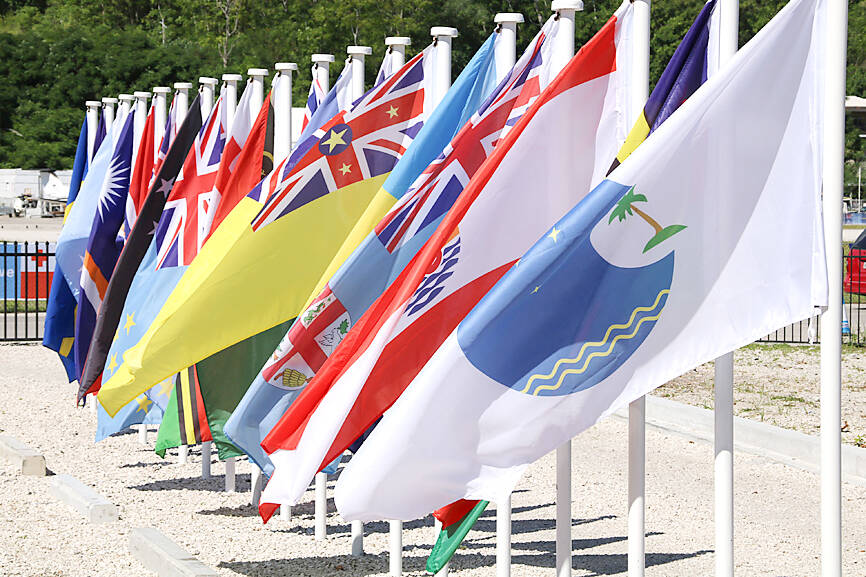The Ministry of Foreign Affairs (MOFA) yesterday expressed disappointment over the Pacific Islands Forum’s (PIF) decision to bar Taiwan and all donor partners from this year’s leaders’ meeting.
“It is understandable yet regrettable” that the Solomon Islands, the host of this year’s forum, decided to invite only PIF member countries, the ministry said in a statement.
However, the ministry acknowledged that there have been precedents in which only PIF members attended the annual summit, and this year’s exclusion was not directed solely at Taiwan, as more than 20 donor partners — including the US and China — have also been excluded from the meeting scheduled for next month.

Photo: AFP
Even so, the ministry urged the PIF to uphold its 1992 agreement granting all partners, including Taiwan, the right to attend the annual leaders’ meeting.
The PIF’s decision followed a lengthy debate at a PIF foreign ministers’ meeting in Fiji on Thursday, where ministers ultimately upheld the Solomon Islands’ move to exclude donor nations.
Tongan Minister of Foreign Affairs Crown Prince Tupouto’a ‘Ulukalala told reporters there had been a “robust discussion.”
“We will engage more closely with partners in the months to come as the region progresses its reform on the partnership mechanism,” New Zealand’s RNZ quoted him as saying.
Earlier this month, Solomon Islands Prime Minister Jeremiah Manele told his country’s parliament that donor countries would not be invited to this year’s PIF summit.
Only the bloc’s 18 members, including Australia and New Zealand, would take part in the 54th PIF Leaders Meeting, scheduled for Sept. 25 in Honiara, Manele told the parliament.
Manele cited an ongoing review of the bloc’s external partnerships as the reason for limiting attendance. However, opposition politician Peter Kenilorea Jr said the decision was “all about China and Taiwan,” Reuters reported.
Speculation over Taiwan’s exclusion has circulated since last year, with reports that the Solomon Islands — which switched diplomatic recognition from Taipei to Beijing in 2019 and is hosting this year’s summit — was acting under pressure from China.
Beijing has approached several of Taiwan’s Pacific allies over the past few years as it seeks to expand its influence in the region and isolate Taipei diplomatically.
Responding to the reports, Chinese Ambassador to New Zealand Wang Xiaolong (王小龍) wrote on X (formerly Twitter) on Friday that Beijing was not responsible.
“To suggest that we have worked to exclude ourselves for the dialogue in the Solomons this coming September just does not stack up,” he wrote.
He said that Taiwan “does not belong” at the meeting and reiterated Beijing’s “one China” principle that sees Taiwan as part of its territory.
Of the PIF’s 18 members, only the Marshall Islands, Palau and Tuvalu maintain formal diplomatic ties with Taiwan. Taipei has participated as a partner since 1993 and has contributed donations to the bloc over the years.
The US, another PIF partner, expressed disappointment last week over the Solomon Islands’ decision to bar Taiwan and other “dialogue and development partners” from next month’s meeting.
“All [forum] partners, and that includes Taiwan, should be invited to participate ... regardless of where it is hosted — just as countries that maintain diplomatic ties with Taiwan invite all dialogue partners, including China,” a US Department of State spokesperson said.

A strong continental cold air mass is to bring pollutants to Taiwan from tomorrow, the Ministry of Environment said today, as it issued an “orange” air quality alert for most of the country. All of Taiwan except for Hualien and Taitung counties is to be under an “orange” air quality alert tomorrow, indicating air quality that is unhealthy for sensitive groups. In China, areas from Shandong to Shanghai have been enveloped in haze since Saturday, the ministry said in a news release. Yesterday, hourly concentrations of PM2.5 in these areas ranged from 65 to 160 micrograms per cubic meter (mg/m³), and pollutants were

Taiwan’s armed forces have established response protocols for a wide range of sudden contingencies, including the “Wan Chun Plan” to protect the head of state, the Ministry of Defense (MND) said today. After US President Donald Trump on Saturday launched a series of airstrikes in Venezuela and kidnapped Venezuelan President Nicolas Maduro, concerns have been raised as to whether China would launch a similar “decapitation strike” on Taiwan. The armed forces regularly coordinate with relevant agencies and practice drills to ensure preparedness for a wide range of scenarios, Vice Minister of National Defense Hsu Szu-chien (徐斯儉) told reporters before a

EVA Airways on Saturday said that it had suspended a pilot and opened an investigation after he allegedly lost his temper and punched the first officer several times as their plane was taxiing before takeoff at Los Angeles International Airport. According to a report published on Thursday by The Reporter, the incident occurred after the flight’s Malaysian first officer tried to warn the Taiwanese pilot, surnamed Wen (文), that he was taxiing faster than the speed limit of 30 knots (55.6kph). After alerting the pilot several times without response, the first officer manually applied the brakes in accordance with standard operating

The New Taipei City Social Welfare Department on Thursday celebrated Paralympic competitor Chen Tzu-wei (張孜維), who received last year’s national Golden Eagle award for exemplary achievement by Taiwanese with disabilities. Chen, who suffers from childhood-onset muscular dystrophy, did not attend the first award ceremony held by the Ministry of Health and Welfare in November due to illness. Chen was formally presented with the award at the department, where he gave thanks to government workers for supporting his education and livelihood, the department said in a statement. Chen was raised by the Ai-hsin Home for Persons with Disabilities in the city’s Bali District (八里)